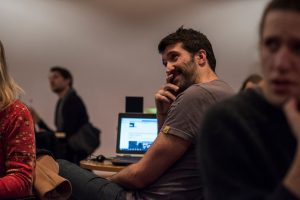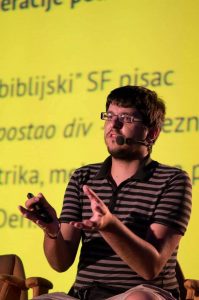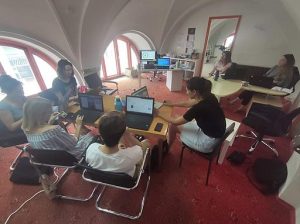IFLA welcomes Laurie Bridges (Oregon State University), Raymond Pun (Alder Graduate School of Education) and Roberto Arteaga (Pacific Lutheran University), three library professionals to talk about their book project to link Wikipedia and academic libraries.
Could you please introduce yourself?
My name is Laurie Bridges (she/her/hers), I am an Instruction and Outreach Librarian at Oregon State University and Associate Professor. I am currently teaching a 2-credit Honors class about Wikipedia and social justice, this is my second time teaching the class. I developed the curriculum and taught it for the first time in the Spring of 2019. I have co-hosted two Wikipedia editathons at my university. I work with a couple of faculty on my campus to help facilitate successful Wikipedia editing assignments (a history course and a writing course). I co-authored two articles in the Journal of Academic Librarianship:
I’m Raymond Pun (he/him/his), a librarian in the Alder Graduate School of Education in California, USA. I’ve organized and participated in Wikipedia-edit-ahons before. I’ve collaborated with teaching faculty in the sciences, women’s studies, and ethnic studies to create opportunities for students to learn about online sources, and the need to engage with online reference materials more critically.
I’m Roberto Arteaga (he/him). I’m an assistant professor and instruction and reference librarian at Pacific Lutheran University. I joined this project after having conversations with Laurie about Wikipedia in relation to library instruction and for-credit courses. I’m just beginning my Wikipedia journey, and I’m particularly interested in developing more pedagogical approaches to teaching with Wikipedia, both in library contexts and beyond.
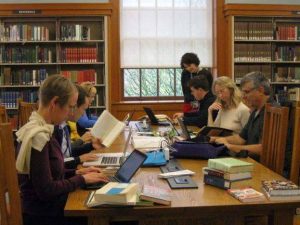
Librarians collaborated with Wikipedians old and new to improve articles related to Multnomah County, Oregon.
Pdx.leecat – CC BY-SA 3.0
You are developing an open access book project on Wikimedia projects and academic libraries, how did this project get started?
Laurie: As I was doing research for my courses and articles I used Merrilee Proffitt’s book, “Leveraging Wikipedia,” which is a great introduction for all libraries and librarians. However, it was missing what I really wanted, an in-depth look into academic libraries and librarians and how they’re using Wikipedia. I started chatting with Ray Pun about this, and from here the idea grew.
Ray: Yes, I agree with Laurie! For the events that I’ve organized with faculty, it was important to have students from underrepresented groups contribute to Wikipedia using library resources. Less than 15% of contributors to Wikipedia were women, based on a survey in 2015. In addition, there is under-representation of content on Wikipedia about women and other minority groups and their perspectives and experiences so that’s where I collaborated with academics to address these issues. Wikipedia is one of the most visited websites and it is very important to add and improve its content.
Laurie: And, around the time I was chatting with Ray about this, Roberto reached out to me, he was considering doing a Wikipedia project in one of his classes and wanted to chat. After our video conversation, in which Roberto asked thoughtful and thought-provoking questions, I started thinking he might be the perfect third to a possible editing team. I talked with Ray and we decided to invite Roberto to join us. I really enjoy working in groups of three.
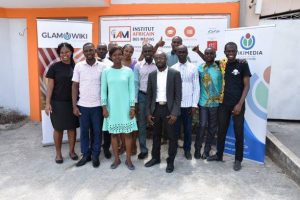
Wikipedia training session in the framework of 1Lib1Ref with 9 librarians and information science professionals in Abidjan, Côte d’Ivoire. Jacquitoz – CC BY-SA 4.0
Could you tell us more about the subjects that will be addressed in this book and why?
Ray: Roberto and Laurie created a website covering the subjects in the book that would be of interest to many people. We hope the book covers case studies coming from theoretical and pedagogical approaches. We are looking for academic library workers to share how they utilize Wikipedia content to promote information literacy, collaboration or research.
Laurie: I have several librarian contacts in Spain, and I was aware that some interesting things were being done with Wikipedia in the Catalonia region. Then, serendipitously I received a grant to attend the Wikimedia + Education conference in San Sebastian, the Basque region in Spain. It was during the conference that I learned librarians in the Basque region are also doing some unique activities. And, during the conference, I really began to think about how librarians around the world are probably doing fascinating things with Wikipedia that are not shared widely, beyond the local region or country. I thought an open access online book might be the best way to collaborate and share information across borders and around the world.
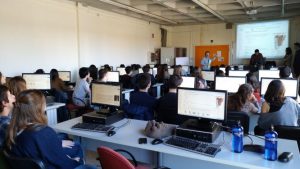
Wikipedia workshop at the Faculty of Medicine on the Leios-Biscay campus in the Basque Country. Theklan – CC BY-SA 4.0
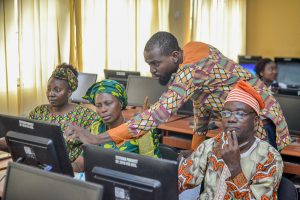
Black history month in Nigeria in partnership with AfroCROWD Kaizenify – CC BY-SA 4.0
According to you, what common goals are there between Wikimedia Foundation’s projects and academic libraries?
Roberto: I would say that just like the Wikimedia Foundation, libraries, in general, are committed to facilitating access to information to their communities. While libraries are often bound by contracts with publishers that prevent from fully opening up resources to everyone, librarians are now, more than ever, beginning to advocate for more content to become more widely available and reduce the content kept behind paywalls.
Ray: Agreed! It is especially important, particularly now during the pandemic. As it has been reported, COVID-19’s Wikipedia page has been one of the most visited sites. Creating more works under open access (OA) will certainly help.
Can you tell us more about the open access model and why you choose it?
Ray: Early in our planning stages, we went with an open access model because we felt that OA would give us and our contributors the flexibility to share their work with colleagues. We envisioned some of our chapters to be multilingual and wanted to enable access to such content. Wikipedia itself is open and for us, it was important to follow that approach.
Laurie: Wikipedia is radically open. Not only do you see the article, but you see the “talk” tab where the conversation is happening, you see the history tab, and you can see contributors’ history over time. One of the reasons Wikipedia is so popular is because it’s available for free, to everyone, anywhere (Of course, there’s censorship, but that’s another story.) Therefore, we felt it was important to have a book that is open and free to librarians.
Finally, what would be your recommendations for libraries wishing to develop Wiki projects?
Laurie: I can answer this question because I just co-authored an article about Wikipedia in libraries for educational use (you can see the post print here). I recommend reaching out and connecting with others, because there is a wealth of knowledge and people are eager to share their successes and failures. Many librarians start with the #1lib1ref campaign, which is low-stakes and easy to get involved with – you just need to add one citation to Wikipedia.
Another popular activity is editathons, happening everywhere in the world. I think the most popular topic for librarian editathons is Art + Feminism. It’s important to note that in-person editathons have been cancelled for the foreseeable future, but there are many remote editathons taking place. In the US and Canada, faculty members can run classes through the WikiEdu dashboard, and librarians can connect with professors who are using the dashboard and offer their expertise. For librarians outside of the US, you can connect with the Wikimedia Education team to find resources in your area.
How can anyone interested find out more?
You can find more information here: https://sites.google.com/view/globalwikipedia/
